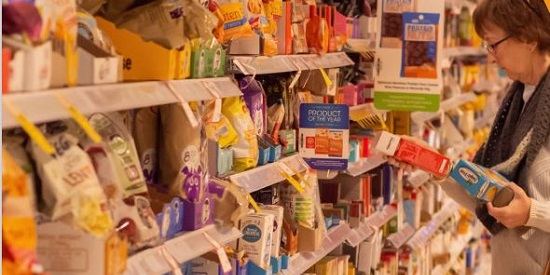Report card shows food manufacturers dragging their heels on nutrition
Media release
A new scorecard of nutrition policies among Australia's largest food and beverage manufacturers reveals little progress is being made to improve the healthiness of food environments, prompting calls for urgent government action.
The scorecard by Deakin University food policy experts rates the nutrition policies and practices of the 21 largest packaged food and beverage manufacturers in Australia, including Nestlé, Unilever, Arnott's, and Coca Cola.
Overall scores range from 23 out of 100 for Refresco Australia (beverage manufacturer) to 65 out of 100 for Fonterra (dairy company). The average score is just 50 out of 100, up slightly from an average score of 42 out of 100 in the previous assessment five years ago.
Professor Gary Sacks, Co-Director of Deakin's Global Centre for Preventive Health and Nutrition (GLOBE) in the Institute for Health Transformation IHT said that food companies continued to ignore calls to stop promoting unhealthy food to children, and it was harming efforts to improve the healthiness of what Australians eat.
'Unhealthy diets and obesity are among the leading contributors to poor health in Australia,' Professor Sacks said.
'A major driver of unhealthy diets are food environments that are dominated by the supply and marketing of unhealthy packaged foods.
'Current government nutrition policies, such as implementation of the Health Star Rating labelling scheme, restrictions on marketing of unhealthy food to children, and nutrition reformulation targets for packaged foods, rely heavily on the voluntary action of food manufacturers.
'But progress from the food industry is painfully slow, reliance on voluntary action is not working, and it's clear that mandatory regulations are now required.'
Launched nationally today, Inside Our Food and Beverage Manufacturers collected information on food company policies and practices from publicly available sources including website and company sustainability reports, focusing on company policies and practices in six key areas:
- corporate strategy,
- product formulation,
- nutrition labelling,
- responsible marketing of unhealthy products and brands (especially to children),
- accessibility and affordability of healthy foods,
- transparency of external relationships.
The evidence collected was scored against industry benchmarks and public health best practice. Scores in each topic were combined to calculate an overall score out of 100 for each company, repeating an assessment that took place in 2018.
The companies were invited to verify the data and provide further information. Sixteen companies chose to take part in this process.
Report author and GLOBE Associate Research Fellow, Ms Jasmine Chan said the goal was to recognise good practice, highlight areas for improvement, and advocate for sector-wide improvements so that food manufacturing companies can better contribute to improving population health.
'Many countries around the world have already mandated front-of-pack nutritional labels on packaged foods,' Ms Chan said.
'Governments in a range of countries, including Norway and Chile, have also put in place comprehensive laws to protect children from exposure to marketing of unhealthy food and drinks.'
'In contrast, Australian kids are bombarded by up to 10 unhealthy food ads per hour when they're online. And less than a third of packaged foods are labelled with the voluntary Health Star Rating.'
Areas of strength in the sector identified in the report include:
- Stated commitments to improve nutrition: Most assessed companies recognised their role in addressing unhealthy diets by publishing overarching commitments related to nutrition and health (17 out of 21 companies).
- Product formulation: Some assessed companies pledged for their products to meet the Australian government's Healthy Food Partnership reformulation targets (9 out of 21 companies).
- Nutrition labelling: Three quarters of assessed companies (16 companies) had some commitments around displaying the government's Health Star Rating (HSR) system on products. However, only four assessed companies have committed to adopt the Health Star Rating on all products, and overall implementation of Health Star Rating across packaged food supply remains well below government targets.
The report outlines six key recommendations for food and beverage manufacturers:
- Healthy food sales targets: Set company-wide targets to increase the proportion of sales from healthy products, and publicly report progress against these targets each year.
- Marketing to children: Take serious action to eliminate children's exposure to the marketing of unhealthy foods and brands, across all marketing channels (including broadcast media, online, product packaging, and outdoor advertising.
- Better nutrition labelling: Commit to full implementation of the Health Star Rating system across all eligible products, with a specific roll-out plan and routine reporting of progress.
- Healthier products: Publicise specific, time-bound targets for reducing sodium, sugar, saturated and energy/portion sizes of products, and routinely report on progress towards targets.
- Affordability and accessibility of healthy products: Work with retailers to ensure that healthier products are widely available, affordably priced and prioritised in retailer price promotions and promotional campaigns.
- Transparency of external relationships: Publish all relationships (including funding and support) with external groups (e.g., government agencies, political parties, research organisations, community groups) related to health and nutrition.

